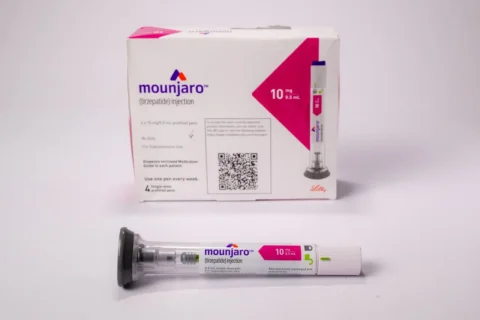What you’ll learn
We’ll walk you through everything about MariTide®, from how this once-monthly injection works differently from weekly weight loss drugs to what the clinical trial results mean for real people. You’ll discover why this new approach to obesity treatment has researchers excited and what the realistic timeline looks like for availability.
The weight loss medication world keeps evolving. Weekly shots like Wegovy® and Zepbound® changed how doctors treat obesity. Now, MariTide® is offering a once-monthly option that could make treatment even easier to stick with.
What’s interesting about MariTide isn’t just the dosing schedule, though.
This weight loss drug takes a completely different approach to the hormones that control hunger and body weight. Early results suggest people might avoid hitting that frustrating weight plateau that can happen with other medications.
At QuickMD, we’ve prescribed weight loss medications to thousands of patients and stay current with emerging treatments. We’re closely monitoring MariTide and other experimental drugs while helping patients achieve results with proven options available today.
What is MariTide and what makes it different?
MariTide (maridebart cafraglutide) represents a new class of weight loss drug that works on the same brain pathways as other GLP-1 medications, but with a unique twist. One of the most talked-about features of MariTide is how often it’s taken, and that’s where it stands out right away in terms of weight reduction.
The monthly advantage of MariTide
While current weight loss drugs like Wegovy and Zepbound need weekly shots, MariTide only requires dosing monthly or less.
This is because of its monoclonal antibody structure, which keeps the drug active in your body for about 21 days. Compare that to current medications that last roughly a week.
Less frequent dosing could help more people stick with long-term weight control programs. But dosing isn’t the only thing that sets MariTide apart. The way it works inside your body is also unlike anything currently on the market.
How MariTide works in your body
MariTide is designed as a monoclonal antibody linked to two GLP-1 peptides, creating what researchers call a peptide-antibody conjugate.
This structure allows the medication to work on multiple levels.
The GLP-1 activation
Like other successful weight loss medications, MariTide activates GLP-1 receptors in your brain and digestive system. This helps:
- Slow stomach emptying, making you feel full longer
- Reduce appetite and food cravings
- Improve blood sugar control
- Signal satiety to your brain
The GIP antagonism difference
What makes MariTide unique is that it blocks glucose-dependent insulinotropic polypeptide (GIP) receptors instead of activating them. While scientists are still studying exactly why this works, early research suggests that blocking GIP may:
- Enhance the weight loss effects of GLP-1 activation
- Help prevent weight regain
- Improve metabolic health markers
Want to dig deeper into weight loss science and treatment trends? Our Learning Center covers everything from how GLP-1s work to tips for long-term weight management. These scientific mechanisms sound promising, but what do the clinical trial results actually show? Let’s look at the data.
MariTide phase 2 study results: what the data shows
MariTide has completed phase 2 trials with results published in the New England Journal of Medicine. The study followed 592 adults, divided into two groups (or “cohorts”):
The participants
- Cohort A: 465 people living with obesity but no type 2 diabetes
- Cohort B: 127 patients who had both obesity and type 2 diabetes
Weight loss results
For people without diabetes:
- 12.3% to 16.2% average weight loss when counting everyone who started
- Up to 19.9% for people who completed the full study
- The placebo group lost only 2.5%
For people with obesity and diabetes:
- 8.4% to 12.3% weight loss overall
- Up to 17% for those who finished treatment
- The placebo group lost just 1.7%
What do these numbers mean?
If you weigh 200 pounds, a 15% weight loss would bring you down to 170 pounds, a major change that most people would notice in their daily lives, clothing fit, and overall health.
MariTide showed something researchers hadn’t seen before. People kept losing weight for the entire 52 weeks without hitting that frustrating weight loss plateau.
This suggests longer treatment might lead to even further weight loss.
Those numbers (19.9% and 17%) only include people who stuck with the medication for the full year. Many others quit early because of side effects. The more realistic numbers include everyone who started, whether they finished or not.
As with any weight loss medication, the numbers only tell part of the story. How well people tolerate the drug also plays a major role in long-term success.
[Looking for results now? While MariTide is still in development, proven GLP-1 medications like Mounjaro® and Ozempic® are already helping thousands of people lose weight and improve their health. We offer same-day consultations and personalized plans to help you get started.]
Managing side effects and tolerability
Like all weight loss medications, MariTide can cause gastrointestinal side effects, which are among the frequently reported adverse events, but researchers have discovered important strategies to minimize these issues.
Common side effects of MariTide
Gastrointestinal events affected more than 90% of people taking MariTide, similar to other GLP-1 medications:
- Nausea (most common)
- Vomiting
- Constipation
- Diarrhea
- Abdominal discomfort
Most gastrointestinal side effects reported in the MariTide trials were mild to moderate in severity, tended to occur early in treatment, and often decreased over time. With gradual dose escalation, many patients were able to stay on treatment and continue losing weight with fewer interruptions.
Addressing discontinuation rates: the MariTide dosing solution
Researchers figured out that starting patients on MariTide at full strength caused major problems.
Some groups experienced extremely high rates of vomiting (up to 92%) when on the initial starting doses, which were full-strength doses right away.
- Why fixed dosing caused issues: Starting patients on full-strength doses led to dropout rates (~11%) because of severe stomach side effects.
- How a gradual approach improved tolerability: Slowly ramping up the dose cut quit rates down to just 8% while still delivering the same weight loss results.
Amgen learned from this.
For Phase 3 trials, they’re planning an even gentler, slower dosing schedule. Start at a low dose of 21mg, then 35mg, then 70mg before hitting target doses. The focus shifted to keeping people on treatment rather than rushing to maximum doses to avoid early discontinuation.
As with any weight loss medication, the numbers only tell part of the story. How well people tolerate the drug also plays a major role in long-term success.
MariTide vs. current weight loss options
Here’s how MariTide compares to other leading GLP-1 medications on the market:
| Medication | Frequency | Typical Weight Loss | Mechanism |
| MariTide | Monthly | 12-20% | GLP-1 agonist + GIP antagonist |
| Wegovy | Weekly | ~15% | GLP-1 agonist |
| Zepbound | Weekly | ~20-23% | GLP-1 + GIP dual agonist |
| Mounjaro | Weekly | ~16-22% | GLP-1 + GIP dual agonist |
| Ozempic | Weekly | ~15% | GLP-1 agonist |
While Zepbound may lead to slightly more weight loss overall, MariTide’s monthly dosing and new mechanism could be a better fit for some people.
Current limitations of MariTide
MariTide faces some challenges compared to established treatments:
- Higher discontinuation rates in early trials
- More complex dose escalation requirements
- Still years away from availability
- Unknown cost and insurance coverage
Of course, every patient is different. So, who might actually benefit most from a drug like MariTide?
Who might benefit from MariTide?
Based on clinical trial data, MariTide is being studied for chronic weight management in several populations.
Primary candidates for MariTide
People living with obesity who might benefit include:
- Adults with BMI ≥30 kg/m² (obesity)
- Those with BMI ≥27 kg/m² with obesity-related conditions
- Patients with both obesity and type 2 diabetes
- People seeking long-term weight control with less frequent dosing
Specific health conditions
Phase 3 trials will study MariTide in patients with:
- Atherosclerotic cardiovascular disease (blocked arteries)
- Heart failure
- Kidney disease
- Obstructive sleep apnea (breathing problems during sleep)
- High blood pressure
MariTide availability
Right now, MariTide is progressing through Phase 3 trials as part of Amgen’s MARITIME program. It’s one of the most comprehensive obesity drug development efforts in recent years.
Current status of MariTide
Active Phase 3 trials:
- Study 1: 3,500 people living with obesity without type 2 diabetes
- Study 2: 999 patients with both obesity and type 2 diabetes
- Additional studies planned: Trials for obesity-related conditions, including heart failure, kidney disease, and obstructive sleep apnea, will begin later in 2025.
What Phase 3 will tell us
The larger Phase 3 trials in the MARITIME program will provide crucial information about:
- Long-term weight control effectiveness
- Optimal dose escalation strategies
- Health outcomes in patients with obesity-related conditions
- Real-world adverse events and discontinuation rates
Current treatment options while waiting
Since MariTide won’t be available for several years, proven weight loss medications can provide significant benefits now.
FDA-approved weight loss options
Weekly GLP-1 medications:
- Mounjaro (tirzepatide): 16-22% weight loss
- Wegovy (semaglutide): Typically, 15% weight loss
- Zepbound (tirzepatide): Often 20-23% weight loss
Why starting GLP-1s now makes sense
Obesity increases risks for type 2 diabetes, heart failure, cardiovascular disease, and other serious conditions.
Current medications can:
- Provide immediate health benefits
- Improve diabetes control and blood pressure
- Reduce cardiovascular disease risk
- Enhance quality of life and mobility
At QuickMD, we stay on top of the science behind weight loss medications. Here’s how we keep our patients informed and supported through every step of the journey.
How QuickMD stays current with new treatments
We help patients navigate current obesity treatment options while staying on top of emerging therapies like MariTide.
Our approach today
QuickMD providers help you address any health concerns or health goals. Here’s how:
- Complete evaluation of your obesity and related health conditions
- Medication selection from currently available weight loss drugs
- Regular monitoring and dose adjustments
- Updates on new treatments as they progress through development
Monitoring emerging weight loss treatments
At QuickMD, we stay current with the latest developments in weight loss science, including trials and regulatory updates for MariTide and other promising medications. As new data emerges, we’ll keep our patients informed about how these treatments are performing, when they might be approved, and what insurance coverage could look like. Of course, no treatment is perfect. MariTide shows real promise, but it also comes with trade-offs.
Starting weight loss treatment with QuickMD
Effective obesity treatment is available now while we wait for future options like MariTide.
Current weight loss medications have transformed the lives of millions of people. We can help you find the right option for your situation while keeping you informed about MariTide and other developments in obesity treatment.
Frequently asked questions about MariTide
Is MariTide FDA-approved?
No, MariTide is not FDA-approved.
When will MariTide be available?
It won’t be available for a few years. It’s currently in Phase 3 clinical trials as part of Amgen’s MARITIME program, which is the final stage of testing before a company can apply for FDA approval. MariTide won’t be available to patients until it completes these trials (expected 2027-2028) and receives FDA approval, which realistically won’t happen until 2029-2030.
What does it mean that MariTide is a monoclonal antibody?
MariTide uses a monoclonal antibody structure, which is different from smaller peptide-based medications like Wegovy. This larger structure stays active in the body for about 21 days, allowing for once-monthly dosing. It also enables MariTide to do two things at once: activate GLP-1 receptors (to reduce appetite and improve blood sugar) and block GIP receptors (which are involved in fat storage and insulin regulation).




